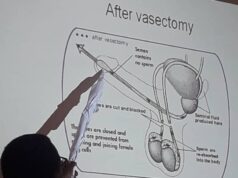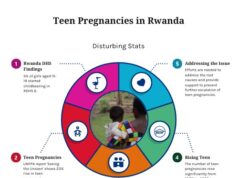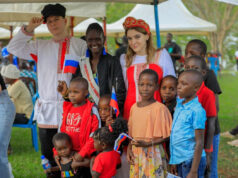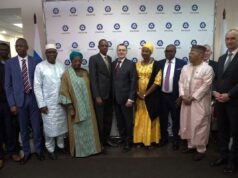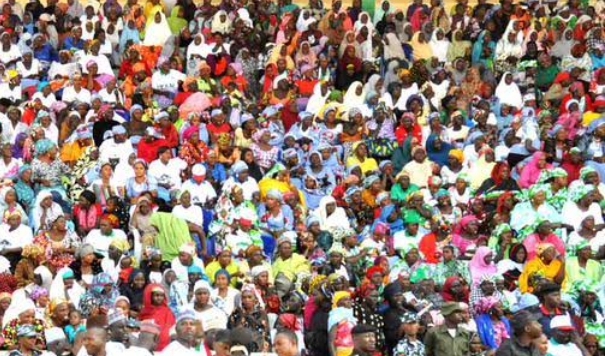
Let women lead!
This feature delves into how the trends of negative societal perception toward young women’s participation in politics are as old as the existence of democracy in Northern Nigeria.
Hon. Anna Bitrus who emerged as the only female among the four supervisory councillors in Biu Local Government Area, of southern Borno, assumed the office of councillor in her ward (Zarawuyaku). The active and vibrant young woman shared her political journey, the patriarchal structure of her community, and how she endured.
“My parents believed I am putting my dignity at stake by showing interest in politics, they were scared that I am going to cause criticism and judgmental arguments against our family,” Hon Anna Bitrus explained.
“My father was worried that I am still single because it is perceived that a well-trained young lady will not join politics at any level and this is regardless of her motive,” she said.
Hon Anna Bitrus, assent how passion nurtured her dreams in politics.
“I don’t know what exactly I wanted to achieve in politics at that time, but all I wanted was to see myself participating, so, I had to beg them (my parents) every day, luckily other relatives, supported me in convincing them, and that was how I started,” she noted.
“As a northern young woman, politics is not something I presume to be easy, so, I identified some people within our locality, whose passion inspires me and I seek their guidance. These people mentored me while I depicted my commitment,” Hon Anna Bitrus said.
The perception of people from this angle of the world towards young women in politics is not only restricted to the negative perception but also includes doubting entrusting them with leadership positions.
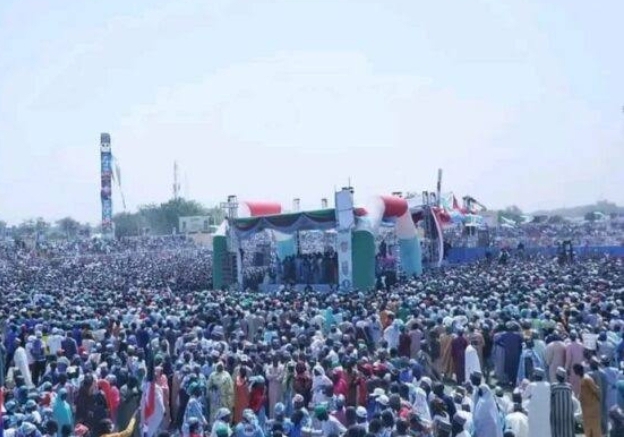
“How people lack confidence in me in the political space has been a challenge to me, because it gives me some level of self-doubt at a point, but persistently, I try to prove myself until today when I was given the position of a supervisory councillor in the local government,” she laments.
Emerging issues when interest is declared
Folks in Northern Nigeria are best known for strong cultural and social sentiments. Borno State also values the norms that discourage young women’s participation in politics.
People in the political sphere noted some societal issues surrounding young women’s participation in a society like Borno.
The Executive Director, Women in the New Nigeria and Youth Empowerment Initiative (WINN), Comr. Lucy D Unana said “Immediate family are the ones who start to question the intention of a woman who had shown interest in politics, backing their perspective with what will the society think of her, and such pressure leads to the person intending to join the politics, to start giving the decision a second thought,” she said.
“Immediate family are the ones who start to question the intention of a woman who had shown interest in politics, backing their perspective with what will the society think of her, and such pressure leads to the person intending to join the politics, to start giving the decision a second thought,”
In 2021, Ogechi Ekeanyanwu, from The Conversation Africa, asked Damilola Agbalojobi, political scientist and gender specialist, to explain the lack of representation of women in Nigeria’s politics.
Damilola Agbalojobi, said, “There are multiple factors, some are related to the political party systems and structures, this includes the high cost of politics, this prevents women from standing for positions, women don’t have enough money to pay for the mandatory expression of interest and nomination forms required by political parties to run for positions on their platforms”.
Many experts have attributed the poor participation of women to the patriarchy nature of the Nigerian society which has found its roots in the political party structure that threatens the participation of female aspirants and undermines their candidature.
Borno State People’s Democratic Party (PDP) Secretary, Ali Aliyu, said “Societal sentiment plays a significant role in shaping the decision of an individual, which young women participation in politics is not an exception, the valued norm of ‘why wouldn’t she get married’ without considering her motive of wanting to join the politics stood in many young women’s paths to declare their interest,” The Secretary explained.
Former Special Adviser to the Nigerian Vice President-elect, Mahmud Mohammad, said “There is a lack of support, that when a young woman declared her interest in a society like Borno, only a few, if not none, will stand to support her,” he said.
In 2022, Beatrice Eyong, the UN women’s representative to Nigeria and the Economic Community of West African States (ECOWAS) said “Women’s participation in Nigerian politics is very low compared to other African countries” Beatrice Eyong stated this at a one-day meeting organized by the Centre for Democratic Development (CDD).
A report by GenderStrategy Advancement International shows that women’s political participation in Nigeria remains at 6.7 per cent which falls below the global average of 22.5 per cent African regional average of 23.4 per cent, and the West African sub-regional average of 15 per cent.
Women in the Political sphere motivate young women
Aisha Adamu Abdullah, a female politician in Borno, who contested for member House of Representatives in the southern part of the state, in the 2023 elections under the Social Democratic Party SGP had this to say:
“The number we occupy in the country’s population is a power that we can use to bring about changes and decide women’s fate in politics, supporting our fellow women means that we are ready to have women as our representatives, therefore, every young woman at whatever age that civically wanted to contribute her quarter to the national development should stand firm to protect her interest and we are here to support her,” she mentioned.
According to a United Nations (UN) report, Women make up over 49 per cent of Nigeria’s population.
The WINN Executive Director, Lucy D Unana encourages young women to not relent regardless of the challenges.
“The fact that women are being attacked with obstacles in the political arena shouldn’t break us, we can not give in because of the discrimination by societal intimidations, we have been through a series of battles as women and if evaluated we are changing a lot and making an impact,” she said.
“I am calling on the young women in Borno, northeast, and Nigeria in general, to come and join us, the political sphere needs you regardless of your age because credibility is integral, so don’t let the societal perception deter you, we are here to mentor and ensure that you soar in your political journey,” Ms Lucy Unana said.
Hon Anna Bitrus, speaks with all power to call on young women to stand for what they want regardless of societal pressure.
“What people think of a young woman in politics doesn’t define what she will become. When I started, what people thought of me threatened my dreams, but I persevered, I am now married and still pursuing my career as a politician, you too can do the same or even more,” she said.
In commemoration of the 2023 International Women’s Day (IWD), premium times reported that from 1999 till date, only 157 women have been elected into the 469-member National Assembly (38 senators and 119 members of the House of Representatives), compared to 2,657 men (616 senators, 2,041 reps) during the same period.
Experts’ opinion/proffered solutions
The Borno State People’s Democratic Party (PDP) Secretary, Ali Aliyu said “If we want to do away with the issue of toxic societal perception towards young women’s participation in politics, then politics at all levels should bring cultural and religious leaders to the table because these people drive every society when it comes to opinion and beliefs, as they can logically bring about a sustainable sensitisation towards the whole issue,” he explained.
The PDP administrative officer, Ali Aliyu further identifies women’s visibility in the mainstream media as a strategy that will bring to light the importance of women in politics and can also help to create awareness of the negative perception surrounding women in politics.
“The mainstream media should double their effort towards women’s visibility, particularly broadcast media, because the media lead people, people imitate what is being disseminated by the press, and can be another way to inspire young women who want to take part.”
“Programmes that focus on women in politics should be done in local languages as the opinion of elderly people still drives many of our communities,” the PDP secretary noted.
Ms Lucy D Unana emphasized the need for mentorship for the young women who had shown interest.
“There is a need for the women who are already occupying a space in politics or have already understood the dos and don’ts to guide and help in nurturing the young women’s dreams to the extent that they get to understand negative opinions shouldn’t count when you are up to something as an individual,” she stated.
Mr Mahmud Mohammad who also understands politics in Borno stated the need for political parties to give equal chances to women, and uplift them to assume any position.
“There are certain positions that only women can champion the privilege, so limiting their access to these positions means depriving the entire nation of the privilege of having the opportunity, as Nigerians we need to do better by standing by these women who are ready to deliver,” Comr. Mahmud Mohammad said.
This story is part of the African Women in Media (AWIM)/Luminate Young Women in Politics Media Project




